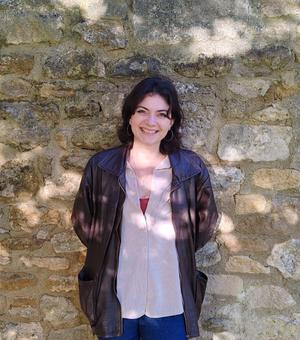Corinne Clark
Thesis Title: Liquid Sweetness: Medicine, Cognition and Devotion in Middle English Literature
Supervisor: Professor Annie Sutherland
Research interests: Middle English devotional literature; Old English devotional literature and hagiography; Old Norse language and literature; global Middle Ages; disability studies; the Medical Humanities; physiology; scribal practice and manuscript transmission; cognitive theory.
My doctoral research is on the intersection between medicine, emotion, and religious practice in Middle English devotional literature, with a particular focus on honey-adjacent concepts of sweetness in the lived and literary contexts of thirteenth-century religious communities. Used to sweeten wine and coat the edges of wounds as an antimicrobial agent, sweet substances like honey sit on the boundaries between consumable, curative, and contaminant. As a metaphorical concept, ‘sweetness’ was often ascribed to affective visions of Christ or Mary, and nectar, honey, and sweet appellations recur frequently throughout Passion meditations and commentaries. My thesis seeks to address the ways in which these substances transcend – or perhaps transgress – the boundaries between the physical and the spiritual, and to explore complicated connections between a multivalent sweetness which may stray into bitterness or excess. This research is generously funded by an Anne Hudson studentship.
I have a professional background in digital publishing and administrative research support, and was a research and teaching assistant at the University of Geneva from 2023-2024 following my Masters in English (650-1550) at Merton College, Oxford, and a BA in English at Fitzwilliam College, Cambridge. My work on scribal variation in the manuscripts of Thomas of Erceldoune was shortlisted for the Medium Ævum essay prize and was published in the Journal of the Early Book Society in 2023.
Teaching
Whilst at the University of Geneva I taught seminars on Analysis of Texts (BA1) and a medieval seminar on Magic and the Supernatural in Middle English romance texts (BA4).
Publications
‘Gasts and Gaps: Making Space for Souls in the Middle English Gast of Gy and an Illumination in MS Getty 31’, Nottingham Medieval Studies, 69 (forthcoming, 2025).
‘What are your words worth? Conversation and conversion in Laxdœla Saga’, Oxford Research in English, 16 (forthcoming, 2024).
‘Old Places, New Wor(l)ds: The Scribe of Cambridge University Library MS Ff.5.48 and Place Names in Thomas of Erceldoune’, Journal of the Early Book Society, 26 (2023).
Selected conferences
‘Integrating Global Perspectives in Medieval Studies’, Addressing Difficult Aspects of Medieval Studies (A.D.A.M), University of Oxford, September 2024.
Embodied Sweetness: Honey and Memory in the Middle English Wooing Group’, Bodies and Boundaries, Bristol Centre for Medieval Studies Postgraduate Conference, University of Bristol, April 2024.
‘A Wild Dragon Appears: Difficult Significations in the Life of St. Margaret’, Signs and Scripts, Oxford Medieval Postgraduate Conference, University of Oxford, April 2024.
‘Romancing the Eildon Stone: Scribal Dislocations in Thomas of Erceldoune’, Lost Manuscripts and Printed Books I (EBS), 58th International Congress on Medieval Studies, Kalamazoo, May 2023.
‘Gasts and Gaps: the Gast of Gy and manuscript depictions of ghosts and revenants’, Spirits and Spirituality in Medieval Britain and Ireland C. 600 – 1400, University of Nottingham, March 2022.




